
The Balkans, also known as the Balkan Peninsula, are a geographic area in southeastern Europe with various definitions and meanings, including geopolitical and historical. The region takes its name from the Balkan Mountains that stretch throughout the whole of Bulgaria. The Balkan Peninsula is bordered by the Adriatic Sea in the northwest, the Ionian Sea in the southwest, the Aegean Sea in the south, the Turkish Straits in the east, and the Black Sea in the northeast. The northern border of the peninsula is variously defined. The highest point of the Balkans is Mount Musala, 2,925 metres (9,596 ft), in the Rila mountain range, Bulgaria.

Galium is a large genus of annual and perennial herbaceous plants in the family Rubiaceae, occurring in the temperate zones of both the Northern and Southern Hemispheres. Some species are informally known as bedstraw.
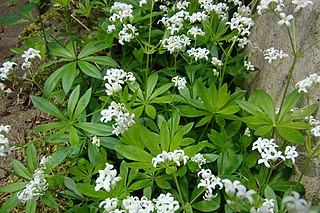
Galium odoratum, the sweetscented bedstraw, is a flowering perennial plant in the family Rubiaceae, native to much of Europe from Spain and Ireland to Russia, as well as Western Siberia, Turkey, Iran, the Caucasus, China and Japan. It is also sparingly naturalized in scattered locations in the United States and Canada. It is widely cultivated for its flowers and its sweet-smelling foliage.

Galium verum is a herbaceous perennial plant of the family Rubiaceae. It is widespread across most of Europe, North Africa, and temperate Asia from Palestine, Lebanon and Turkey to Japan and Kamchatka. It is naturalized in Tasmania, New Zealand, Canada, and the northern half of the United States. It is considered a noxious weed in some places.

Galium album, the white bedstraw or hedge bedstraw, is a herbaceous annual plant of the family Rubiaceae.

Galium mollugo, common name hedge bedstraw or false baby's breath, is a herbaceous annual plant of the family Rubiaceae. It shares the name hedge bedstraw with the related European species, Galium album.
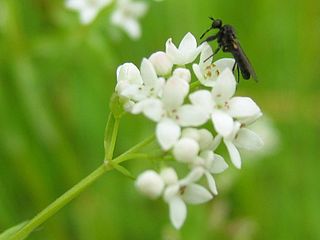
Galium palustre, the common marsh bedstraw or simply marsh-bedstraw, is a herbaceous annual plant of the family Rubiaceae. This plant is widely distributed, native to virtually every country in Europe, plus Morocco, the Azores, Turkey, Turkmenistan, Western Siberia, Greenland, eastern Canada, St. Pierre & Miquelon, and parts of the United States. The species is classified as a noxious weed in New York, Pennsylvania, Massachusetts, Connecticut, Vermont and New Hampshire. It is considered naturalized in Kamchatka, Australia, New Zealand and Argentina.

Galium boreale or northern bedstraw is a plant species of the Rubiaceae. It is widespread over the temperate and subarctic regions of Europe, Asia and North America including most of Canada and the northern United States.

Galium saxatile or heath bedstraw is a plant species of the genus Galium. It is related to cleavers.

Galium spurium, the stickwilly or false cleavers, is a plant species of the Rubiaceae. It is widespread across Europe, Asia, Africa and Canada, and is naturalized in Australia. It is considered a noxious weed in many places.
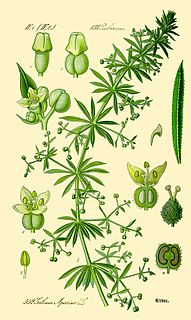
Galium aparine with many common names including hitchhickers, cleavers, clivers, bedstraw, goosegrass, catchweed, stickyweed, sticky bob, stickybud, stickyback, robin-run-the-hedge, sticky willy, sticky willow, stickyjack, stickeljack, grip grass, sticky grass, bobby buttons, whippysticks and velcro plant, is an annual, herbaceous plant of the family Rubiaceae.

Galium parisiense is a species of flowering plant in the family Rubiaceae known by the common name wall bedstraw. A native of the Mediterranean area and Western Europe, it has become naturalised in North America and other parts of Europe.

Galium trifidum is a species of flowering plant in the coffee family, known by the common name three-petal bedstraw. It grows widespread in the arctic, temperate and subtropical regions of the Northern Hemisphere: northern and central Asia, northern and eastern Europe and much of North America.
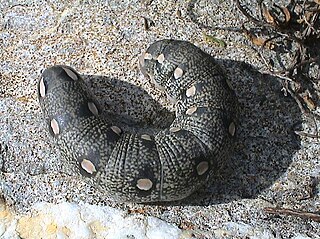
Hyles vespertilio is a moth of the family Sphingidae.
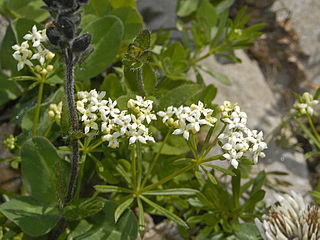
Galium anisophyllon, common name bedstraw or gaillet, is a flowering perennial plant in the family Rubiaceae.
Galium bermudense, the Bermuda bedstraw, is a plant species in the family Rubiaceae. It is native to Bermuda, the Bahamas, and the southeastern United States.
Galium orizabense is a species of plants in the family Rubiaceae, named for the town of Orizaba in Veracruz, where the first collections of the species were made. The species is native to Mexico, Costa Rica, Guatemala, Panamá, Venezuela, Colombia, and Hispaniola, plus widely scattered locations in the southeastern United States.

Galium litorale is a rare species of bedstraw in the Rubiaceae family. It is endemic to the island of Sicily in the Mediterranean Sea. In Italian it is known as caglio costiero.















